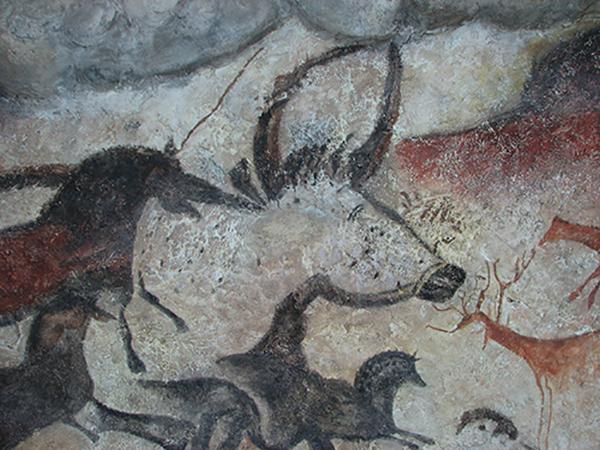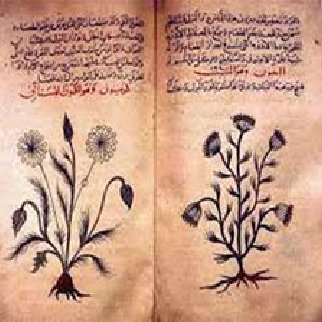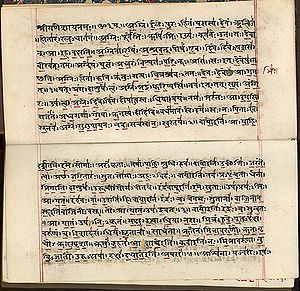Many say aromatherapy began in Ancient Egypt, as far back as 3000BC, where aromatics were a part of daily life. Herbs and spices were used in the home for cooking, cleansing and healing, and Egypt's perfumers were well aware of the power of scent to intoxicate the spirits. But the roots of aromatherapy grow back much further.
Primitive remedies
In the Dordogne region of France, the famous Lascaux cave paintings reveal the medicinal role of plants among early humans as far back as 18,000BC. It is unknown how many shamans knew which herbs cured which ailments. Perhaps this was through a process of trial and error, or maybe they were guided by spirits?

Whichever the case, plants and certain smells came to be associated with qualities that could fight off disease demons or help mend broken bones. The principles of aromatherapy were born in prehistory, long before civilisation had begun.
The role of smell in prehistory
In the Summer, when the aroma of plants lingers in the air, it's easy to imagine that nature's fragrant garden was created purely for your pleasure. But the real reason is more practical. Plants use scent to attract pollinating insects or to ward off predators and for early humans scent was an indicator of a plant's properties.

The sense of smell is linked to an ancient part of the brain - the limbic system or emotional centre. When you smell, scent molecules are filtered through tiny hairs in the nose called cilia, sending impulses to the brain causing nervous reactions. Depending on the aroma, it will calm or excite.
Smell memory
Smell is a strong key to memory and led by their noses, literally, primitive humans soon developed knowledge of aromatic plants by learning and remembering which could cure and could kill.
Ancient aromatherapy
The precursor of aromatherapy in the ancient world was herbalism, although it is speculated that some civilisation had discovered how to extract essential oils.
Egyptian roots
Egypt is often credited as the cradle of the sciences. The Nile Valley nurtured medicine as precious plants such as frankincense, myrrh and cinnamon were brought to be cultivated along its banks. There is evidence to suggest that aromatics were used in China and India first, but the use of fragrance was perhaps more widespread in Egypt than anywhere else.
Papyri have been found describing the cultivation of flowers and herbs. The Papyrus of Ebers (1550BC) provides hundreds of plant based remedies for external problems, such as skin conditions, and internal ones, such as respiratory difficulties.
It is thought the Egyptians invented a process to extract oils, evidenced by the findings of essential oil residue on mummies.

Chinese roots
Very imaginative in the employment of aromatics, the Chinese often had many uses for one herb. Jasmine flowers fragranced the hair, were hung in the house and flavoured tea. China's own tomes of natural medicines were just as impressive as the Egyptians'. The Great Herbal (circa 2000BC) was the medicinal bible of Emperor Shen Nung and lists 365 herbs and Emperor Huang Ti's The Yellow Emperor's Classic of Internal Medicine (2650BC) prescribes the treatment of fragrant herbs and massages.

The Yellow Emperor was one of the earliest texts to advocate the importance of the harmony of the spirit with the natural world and it also describes how to take a detailed case study before commencing treatment.
This is the foundation of aromatherapy and naturopathic medicine today.
Indian roots
Ayurveda, the world's oldest and most complete system of holistic medicine, has used oils such as basil, coriander, ginger and sandalwood for millennia. Vedic literature, dating back to 2000BC, lists more than 700 plants for religious and medical use.
The philosophy of natural medicine presented in the Rig Veda is not unlike that advocated by The Yellow Emperor.
It states humans have been appointed a sacred duty to care for the precious gifts of creation, of which humans are a part. in return, plant essences bring the human into harmony with nature.

Persian-born physician Avicenna (980-1037AD) is credited with inventing steam distillation of oils, but a 5000-year-old terracotta still was found at the foot of the Himalayas and is now displayed in Pakistan's Taxila Museum.
Greek and Roman roots
Much of Greek medicine was founded on Egyptian healing, though the Greeks can take credit for greatly developing these systems.
Ancient Greece's 'Father of Medicine', Hippocrates, prescribed aromatic baths in his Aphorisms.

Asclepiades recommended bathing and massage as therapies for body and mind. The famous botanist Theophrastus noted the effects of external poultices on internal organs - just as modern aromatherapists observe the effects of externally-applied compresses on internal disorders.
Rome also contributed to the ancients world's legacy to aromatherapy. Dioscorides' De Materia Medica (first century AD) dedicates one volume to aromatic plants and this work contributed to today's understanding of medicinal herbs.